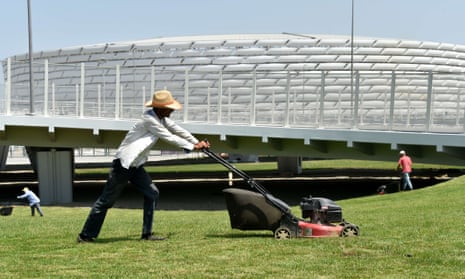You had to admire Uefa’s steadfastness in the face of unfortunate timing. The decision to award the hosting rights for the Europa League final to Baku, the capital of Azerbaijan, was made public in September 2017, just a few weeks after entirely unrelated revelations about a huge underhanded campaign to whitewash Azerbaijan’s international reputation.
The so-called Azerbaijani Laundromat scandal came to light thanks to bank leaks that showed about £2bn had been funnelled out of oil-rich Azerbaijan between 2012 and 2014 through various European financial institutions and companies, including some registered in Britain. It was primarily an elaborate money-laundering scam but some lolly found its way into the pockets of lobbyists and politicians who were encouraged to help polish the reputation of Azerbaijan.
In the aftermath of the revelations 13 members of the Parliamentary Assembly of the Council of Europe (Pace) were found to have accepted gifts or bribes from the Azerbaijani government and were expelled from the Council of Europe, an organisation set up in 1949 “to promote democracy and protect human rights and the rule of law in Europe”. The donations were made around the time Pace was compiling a report into institutionalised corruption and the suppression of politician dissent in Azerbaijan.
Ilham Aliyev, the country’s president since 2003, went on to win a third term in 2018, with an impressive 86% of the Azerbaijani electorate apparently convinced there was no better person for the job. Aliyev’s regime does not score so highly on Reporters Without Borders’ World Press Freedom Index, in which Azerbaijan has slipped this year to 166th, the lowest-ranked country in Europe, between Bahrain and Equatorial Guinea.
“Not content with crushing all forms of pluralism, president Ilham Aliyev has been waging a relentless war against his remaining media critics since 2014,” says Reporters Without Borders. “Independent journalists and bloggers are jailed on absurd grounds if they do not first yield to harassment, beatings, blackmail or bribes.”
Still, none of the above has anything to do with Uefa or football, so why not let Baku stage the final of Europe’s second most prestigious club competition. Right?
OK, let’s go with that line of thinking for a moment.
Uefa cannot avoid political considerations altogether because, unhappily for football’s not-for-profit governing body, it turns out that one of the teams who reached the final, Arsenal, have a player from Armenia. There are no diplomatic relations between Azerbaijan and Armenia because of the Nagorno-Karabakh conflict and although Azerbaijani authorities have said they will allow Henrikh Mkhitaryan into the country, Arsenal have yet to be satisfied by Uefa that their midfielder’s safety can be guaranteed. The club, therefore, may feel obliged to omit one of their top players from the most important match of their season.
Uefa is well aware of the depth of the tensions that exist between Azerbaijan and Armenia. There may even be some culture buffs at Uefa who read a report in February in the art journal Hyperallergic, which claimed that over the last 30 years the Azerbaijani government has engaged in the systematic destruction of traces of the country’s Armenian heritage, including Unesco-protected monuments, on a scale beyond that of the Islamic State’s dynamiting of Palmyra in the Syrian desert.
Because of its awareness of the enmity between the two governments, Uefa keeps Azerbaijan and Armenia apart in draws for competitions. But it looks as if it failed to plan for the eventuality of a team with an Armenia international reaching a final. One wonders what will happen if Armenia qualify for Euro 2020. Baku was awarded the right to host four matches in those finals, three group games and a quarter-final.
Uefa’s decision was a publicity coup for the Azerbaijani regime, with the country’s official media organ reacting to the award of the Europa League final by hailing it as another chance for the country to showcase its ability to stage world-class events and to prove it is a major “Eurasian logistical hub”.
Alas, that last claim took a dent when Uefa said Arsenal and Chelsea would be allocated fewer than 13,000 tickets between them for a stadium with more than 68,000 seats because the airport serving Baku cannot cope with more travellers than that. “Offering more tickets to fans of the participating teams … was therefore not the responsible option,” wrote Uefa.
The tickets are very expensive, the venue is far away and, it turns out, the vast majority of fans could not get to the final even if they had the time and money to do so, just like, perhaps, Mkhitaryan.
All things considered, then, Baku was a bad choice. The principle of switching venues from year to year is a good one, however. If, as some have suggested, Uefa waited until the identity of the finalists was known so that it could choose a stadium close to both, then finals would probably be the exclusive preserve of western Europe because that is where most of the continent’s richest clubs are concentrated.
Since 1999, when two-leg finals were scrapped, only five of the 21 Uefa Cup/Europa League finals have had a participant from eastern Europe and there have been none from Scandinavia. Similarly, in the Champions League, there has not been a finalist from eastern Europe since 1991 and, in fact, every one since 2005 has come from Spain, England, Italy or Germany.
If clubs from the rest of the continent cannot realistically expect to reach a final, they should at least be allowed to hope their country hosts one. In the name of fairness. And not, of course, for the wrong reasons.

